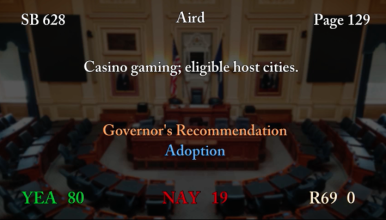You’ve no doubt heard of the glass ceiling — the barrier above which women couldn’t rise professionally — but have you heard about the glass cliff?
It’s not as familiar a term as the ceiling, but the glass cliff is real. It’s what happens when a woman or someone from another marginalized group is put in charge of a failing institution.
This can serve a couple of purposes: The corporation can claim its first hire to a top position of a person representing X group, staving off negative headlines a little longer. Also, if the company is truly at the edge of a financial cliff, the stakes are lower than if the leader could actually do something to turn around the company’s fortunes. Maybe the new leader is just a convenient scapegoat.
It isn’t always evident what’s a glass cliff and what isn’t until later on.
Take Arlington County-based Boeing, for example. Ever since a Boeing 737 Jet experienced a midair panel blowout while filled with Alaska Airlines passengers in early January, the aerospace company has come under considerable federal scrutiny over its safety and manufacturing practices. The Justice Department opened a criminal investigation, and the FBI wrote letters to passengers telling them that they may be victims of a crime.
In April came the corporate fallout: Boeing CEO Dave Calhoun announced he was stepping down by the end of this year, and Stan Deal, head of the Boeing Commercial Airplanes business unit, retired effective immediately.
Now Stephanie Pope, Boeing’s chief operating officer, has also been put in charge of the commercial planes unit — “the toughest job at Boeing,” according to The Wall Street Journal.
This may not be a glass cliff situation. This could be Pope’s proving ground. We just don’t know yet.
A third-generation aerospace employee, Pope led Boeing’s parts and services business and also held several finance positions. After her promotion to COO, she was seen as a probable successor to Calhoun, but GE Aerospace CEO Larry Culp and Carrier Global CEO Dave Gitlin are now favored for Boeing’s CEO, Fortune reported in April.
If hired as CEO, Pope would be the century-old Fortune 500 company’s first woman leader. Boeing’s not exactly a pioneer in terms of hiring female aerospace CEOs — in Virginia alone, we have General Dynamics Chairman and CEO Phebe N. Novakovic and Northrop Grumman Chairman, President and CEO Kathy Warden.
But Boeing never hired a woman to lead its company in good times or even less-bad times.
Now it’s in real trouble. In the first quarter of the year, Boeing delivered 83 jets, down from 157 in the previous quarter, and United told Boeing to halt production of the 737 Max 10 jets it ordered. Sales ground to a halt in January, with only three plane orders, and are still down.
Pope, in her new capacity, wrote in an email to employees last month, “This is a pivotal moment for us, and we have serious work ahead to build trust and improve our operations.”
And who’s in charge? Women.
Pope is joined by Katie Ringgold, who previously led 737 airplane deliveries at Boeing, as new head of the Max program, and Elizabeth Lund has been promoted to senior vice president of quality for Boeing Commercial Airplanes.
They’re tasked with fixing the reputation of Boeing, starting with bringing quality control measures up to standard, most experts acknowledge. These are lessons earlier leaders didn’t learn after two Max 8 planes crashed in 2018 and 2019 incidents, claiming hundreds of lives.
Boeing stopped production of the jets and then resumed in late 2020, but C-suite leaders demanded more jets produced faster, according to a March 28 New York Times article based on interviews with more than two dozen current and former Boeing employees.
We can’t say this is a glass cliff yet. Maybe Pope and company will succeed where others (mainly men) have failed. But it’s not a job most people would want, unless they’re promised golden parachutes.




